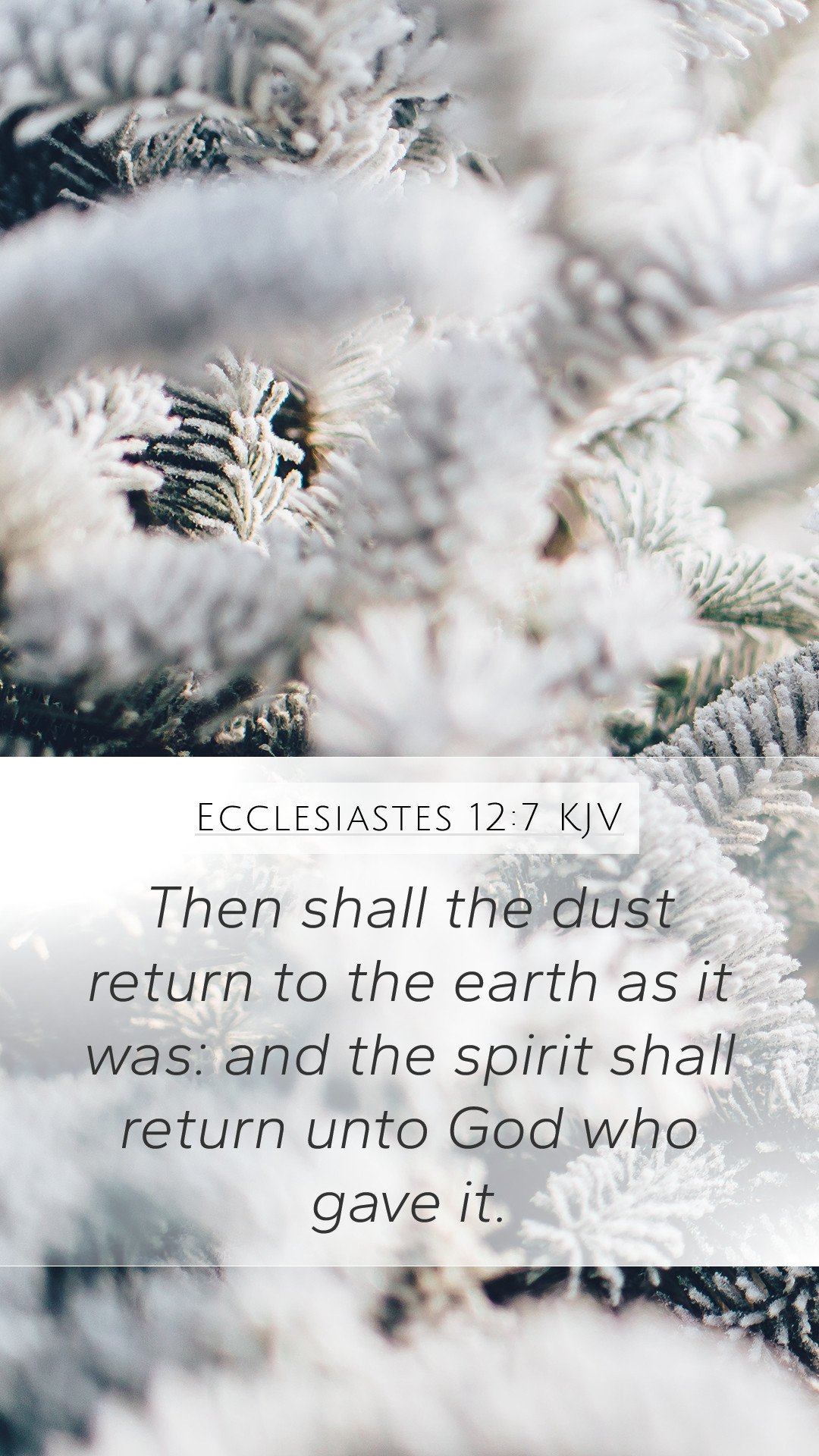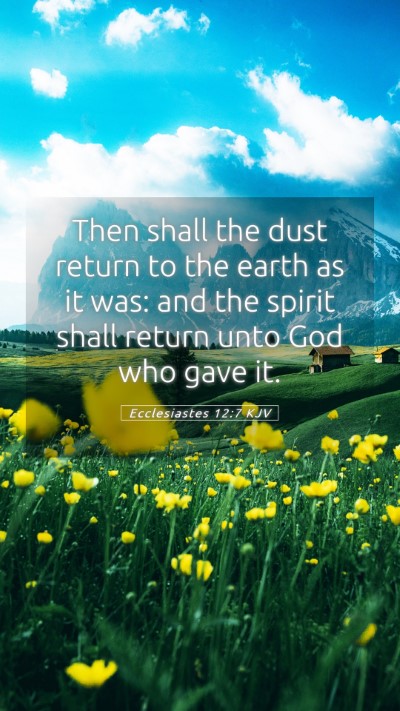Old Testament
Genesis Exodus Leviticus Numbers Deuteronomy Joshua Judges Ruth 1 Samuel 2 Samuel 1 Kings 2 Kings 1 Chronicles 2 Chronicles Ezra Nehemiah Esther Job Psalms Proverbs Ecclesiastes Song of Solomon Isaiah Jeremiah Lamentations Ezekiel Daniel Hosea Joel Amos Obadiah Jonah Micah Nahum Habakkuk Zephaniah Haggai Zechariah MalachiEcclesiastes 12:7 Meaning
What is the meaning of Ecclesiastes 12:7?
Then shall the dust return to the earth as it was: and the spirit shall return unto God who gave it.
Ecclesiastes 12:7 Bible Verse Meaning
Understanding Ecclesiastes 12:7: A Comprehensive Commentary
Ecclesiastes 12:7 states: "Then shall the dust return to the earth as it was: and the spirit shall return unto God who gave it."
Overview and Context
The Book of Ecclesiastes, attributed to King Solomon, addresses the meaning of life and the futility of worldly pursuits. Ecclesiastes 12:7 serves as a powerful conclusion to the reflections on mortality and the limitations of human understanding.
Verse Meaning and Interpretations
In this verse, the transition of the body and spirit is emphasized. The imagery of dust harkens back to Genesis, where God created man from the dust of the ground (Genesis 2:7). This teaches that human life is transient and returns to its origin, while the spirit belongs to God, highlighting His sovereignty over life and death.
Insights from Public Domain Commentaries
-
Matthew Henry:
Henry notes that this verse encapsulates the fate of humanity. The imagery of returning to dust denotes death and the cyclical nature of life. He emphasizes the importance of preparing the soul for its return to God.
-
Albert Barnes:
Barnes elaborates on the duality represented in this verse. The body, a temporary vessel, decays, while the spirit's return signifies a higher purpose and accountability before God. He encourages believers to reflect on the legacy of their actions during their earthly life.
-
Adam Clarke:
Clarke highlights the emotional weight of this verse, urging readers to recognize the inevitable return to God. He stresses that understanding this cycle prompts a deeper contemplation of life's priorities and the spiritual journey.
Application of Ecclesiastes 12:7 in Daily Life
This verse invites readers to ponder the transient nature of earthly existence and the permanence of the spiritual realm. It encourages individuals to:
- Value Spiritual Depth: Cultivate a relationship with God to prepare the spirit for its eventual return.
- Reflect on Mortal Life: Consider how to live purposefully, making choices that align with spiritual values.
- Engage in Biblical Study: Participate in Bible study groups or use Bible study resources to deepen understanding of scripture.
Cross References
Related verses that complement Ecclesiastes 12:7 include:
- Genesis 3:19 – "For you are dust, and to dust you shall return."
- James 4:14 – "For what is your life? It is even a vapor, that appears for a little time, and then vanishes away."
- 2 Corinthians 5:1 – "For we know that if our earthly house of this tabernacle were dissolved, we have a building of God, a house not made with hands, eternal in the heavens."
Conclusion
In summary, Ecclesiastes 12:7 serves not only as a reminder of the physical and spiritual realities of human existence but also as an exhortation to seek fulfillment through a genuine relationship with God. Understanding such significant Bible verses deepens one's faith and encourages a reflective approach to life.
Further Study Suggestions
For those interested in further exploration of this verse and its themes, consider:
- In-depth Bible verse analysis: Examine the context and language of Ecclesiastes.
- Bible study lessons: Look into lessons that address mortality and spirituality.
- Online Bible study: Join virtual studies that focus on understanding difficult Bible passages.
This structured approach to Ecclesiastes 12:7 offers a comprehensive understanding and encourages deeper engagement with the Bible, fostering an appreciation for its teachings.


